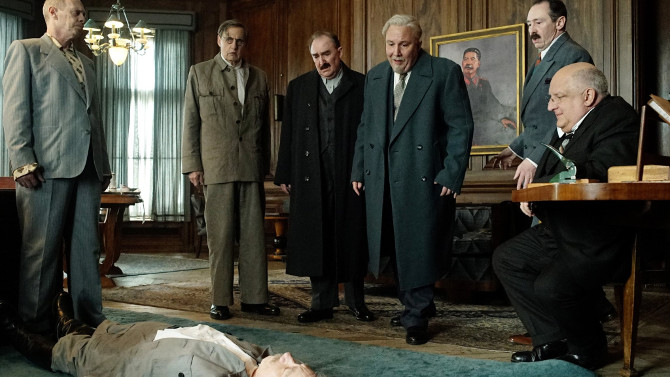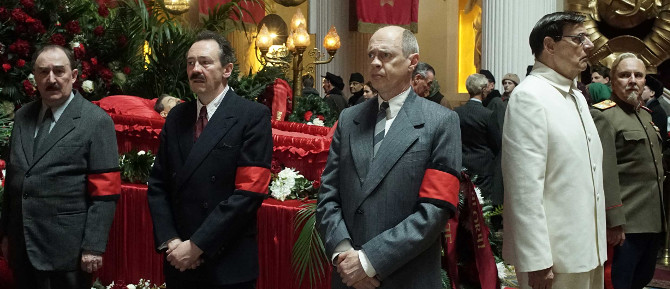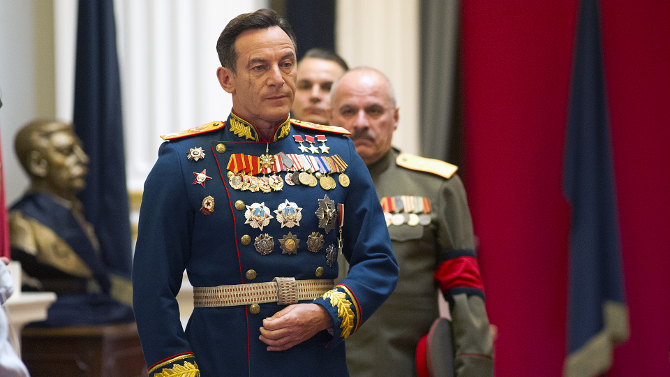Conniving, chaos, cruelty, and paranoia – four words that aptly describe today’s film. . . and, whose first letters provide a hint as to the setting: that’s right – CCCP. The Death of Stalin, Armando Iannucci’s 2017 comedic spin on the historical event, follows in the vein of his BBC series The Thick of It and HBO show Veep, as well as his film In the Loop, a razor sharp political satire with quick banter, clever wordplay, and a more than interesting topic.
Of course, if you know the work of Iannucci, it will be quite obvious that the lexicon of such a film is much more expansive than the four words used to open the piece – fear and power also come to mind. Going hand in hand, it is this power through fear that has Andreyev (Paddy Considine), a theatre manager that has not recorded a broadcast that Josef Stalin (Adrian McLoughlin) now wants a copy of, panicking to keep the band and audience in their seats to do it all over again. . . it is also the same dread that steers Stalin’s guards to stand pat after hearing a thump from within the leader’s room – when in actuality, the dictator is slowly dying, steeped in his own urine. It is this irony, and grey area comedy, that comes from a pitch dark premise – finding an absurd humour in the disturbing story.
With the big boss dead, managing the Soviet Union falls to the Committee: Nikita Khrushchev (Steve Buscemi), Lavrenti Beria (Simon Russell Beale), Georgy Malenkov (Jeffrey Tambor), Vyacheslav Molotov (Michael Palin) – who just prior to Stalin’s death was placed on one of his elimination lists, Lazar Kaganovich (Dermot Crowley), Anastas Mikoyan (Paul Whitehouse), and Nicolai Bulganin (Paul Chahidi). . . while others swirl around the periphery, Stalin’s sharp daughter and wildcard alcoholic son (Andrea Riseborough and Rupert Friend), Field Marshal Georgy Zhukov (Jason Isaacs), and pianist Maria Yudina (Olga Kurylenko).
The two big players are Beria and Khrushchev, the former utilizing Malenkov as a puppet as he manipulates the situation, while the latter attempts to manoeuvre, almost always from behind in his scheming. Trying to keep order, portray strength and transition smoothly, neither are overly adept at this. As Khrushchev puts it to Beria, “you’re just making this shit up as you go along!”, while Malenkov, not truly aware of all the posturing, just attempts to exude confidence – “nod as I’m speaking to you. People are looking to me for reassurance and I have no idea what’s going on”.
Not so much laugh out loud funny, but rather cheekily clever, it causes you to smile. Iannucci, weaving a comedic power struggle out of the brutal chaos, places these historical figures in fascinating scenarios. Plotting whilst trying to stay one step ahead of each other, sometimes literally, Kaganovich is amazed by Khrushchev – “how can you run and plot at the same time?”. . . and, it is safe to say, both of the big wolves have a few secret moves up their respective sleeves – much like a Russian nesting doll.
A two pronged attack, Iannucci is deftly able to work an impressive balancing act, somehow making a topic about the death of a Communist Dictator who murdered countless people funny while never losing the dramatic impact that it is built on (the true definition of a satirist); this, when combined with its pitch perfect cast, is like watching an opera starring the Three Tenors. Voices fuse with moving pieces, each actor bringing their A game to this richly written material. A star-studded cast of comedic character actors – Buscemi, Palin, Tambor, Isaacs, Friend and the rest, hit their notes time and time again, cadence, timing, word-play and everything in between deserving a hearty bravo!!! One of my favourite examples of this is when Stalin’s son asks to give a speech at his father’s funeral, to which Malenkov says, “no problem”. . . after being kyboshed by others, he rephrases it, “when I said no problem, what I meant was, NO – problem”.
Though not wholly accurate, historically speaking, there is quite a bit of truth in The Death of Stalin, Iannucci coaxing out the absurdist comedy found in a dictatorial regime that is enveloped in a tightening cloak of fear, threat of death and a paranoid set of rules that lack logic or understanding. Funnily enough, some of the more outlandish things that occurred in the movie had to be toned down by Iannucci – as he thought they were too incredulous to believe – though actually real (one example being that upon re-performing the musical at the beginning of the film, they actually had to find two replacements for the conductor, not just one – as the original replacement was drunk; while the number of military medals worn by Zhukov are actually fewer than in reality – again, hard to believe). Despite being banned in Russia, Belarus, Kazakhstan Azerbaijan, and Kyrgyzstan, The Death of Stalin is definitely worth checking out, so keep an eye, or two, out for this feature. . . and “don’t worry, nobody’s gonna get killed, I promise you”.




I fully agree, it’s worth checking out this movie, even though when I watched I didn’t know if I was supposed to laugh or cry…
My review is here, if you want to read it!
https://vengonofuoridallefottutepareti.wordpress.com/2018/03/12/the-death-of-stalin-stunning-english/
We’ll be watching it, Nikolai.
Thanks for the comment! Your review provides a very real perspective on this film. . . a challenging topic to be sure.
Let me know what you think, David.